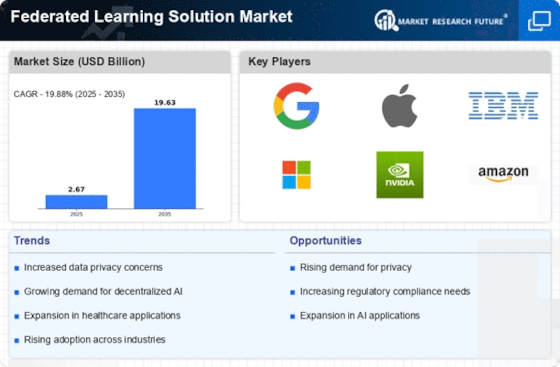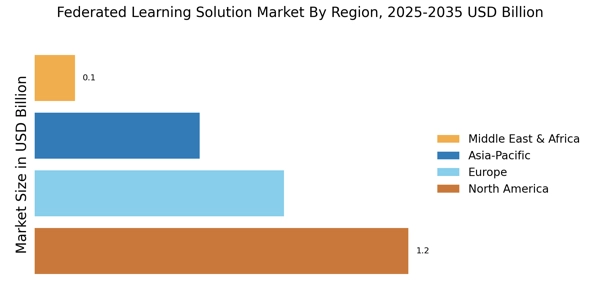Growing Adoption of IoT Devices
The proliferation of Internet of Things (IoT) devices is a key driver for the Federated Learning Solution Market. With billions of devices generating vast amounts of data, traditional centralized data processing methods are becoming increasingly impractical. Federated learning offers a solution by allowing data to remain on the device while still enabling collaborative learning. This not only enhances data privacy but also reduces latency and bandwidth usage. Industries such as smart cities, healthcare, and automotive are particularly poised to benefit from this technology. As the number of IoT devices continues to rise, the demand for federated learning solutions is expected to grow correspondingly. Analysts predict that the market could see a substantial increase, potentially exceeding USD 2 billion by 2027, as organizations seek to harness the power of IoT through federated learning.
Need for Enhanced Data Security
In an era where data breaches and cyber threats are rampant, the need for enhanced data security is driving the Federated Learning Solution Market. Organizations are increasingly aware of the risks associated with centralized data storage, which can be vulnerable to attacks. Federated learning mitigates these risks by allowing data to remain on local devices, thus minimizing exposure to potential breaches. This decentralized approach not only protects sensitive information but also fosters trust among users. As businesses prioritize data security in their operations, the adoption of federated learning solutions is likely to accelerate. The market is projected to grow significantly, with estimates suggesting it could reach USD 1.8 billion by 2026, as organizations invest in secure data processing methods.
Increasing Regulatory Compliance
The Federated Learning Solution Market is experiencing a surge in demand due to the increasing regulatory compliance requirements across various sectors. Governments and regulatory bodies are implementing stringent data protection laws, such as the General Data Protection Regulation (GDPR) and the California Consumer Privacy Act (CCPA). These regulations necessitate organizations to adopt solutions that ensure data privacy while still enabling data analysis. Federated learning, which allows for decentralized data processing, aligns well with these compliance needs. As organizations strive to meet these legal obligations, the adoption of federated learning solutions is likely to rise, thereby driving growth in the market. The market is projected to reach a valuation of approximately USD 1.5 billion by 2026, indicating a robust growth trajectory fueled by compliance demands.
Rising Demand for Personalized Services
The demand for personalized services is a prominent driver in the Federated Learning Solution Market. Consumers increasingly expect tailored experiences, which necessitates the analysis of vast amounts of data while maintaining privacy. Federated learning enables organizations to develop personalized models without compromising user data. This is particularly relevant in sectors such as retail and finance, where understanding customer preferences is crucial. By leveraging federated learning, companies can enhance their service offerings while adhering to privacy regulations. The market is likely to witness substantial growth, with projections indicating a potential market size of USD 2.2 billion by 2028, as businesses strive to meet the rising expectations for personalization.
Advancements in Machine Learning Algorithms
The Federated Learning Solution Market is significantly influenced by advancements in machine learning algorithms. As organizations seek to leverage artificial intelligence for enhanced decision-making, the need for efficient and effective learning models becomes paramount. Federated learning enables the training of algorithms on decentralized data, which not only preserves privacy but also enhances the model's performance by utilizing diverse datasets. This approach is particularly beneficial in sectors such as healthcare and finance, where data sensitivity is critical. The integration of sophisticated algorithms into federated learning frameworks is expected to enhance their capabilities, thus attracting more enterprises to adopt these solutions. The market is anticipated to grow at a compound annual growth rate (CAGR) of around 25% over the next five years, driven by these technological advancements.

















